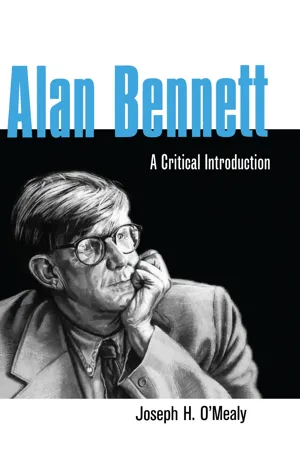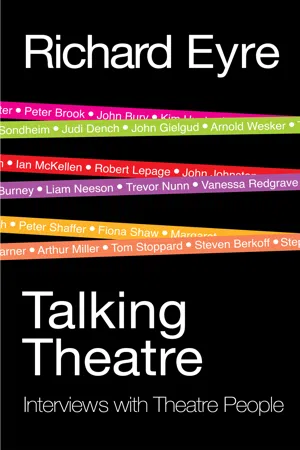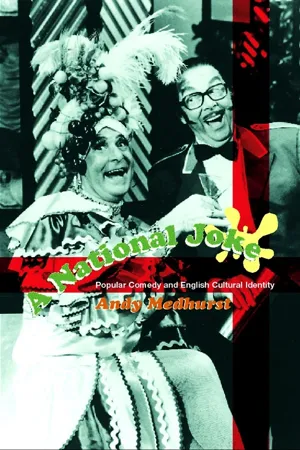Literature
Alan Bennett
Alan Bennett is a renowned British playwright, screenwriter, and author known for his sharp wit and keen observations of British society. His works often explore themes of class, identity, and the human condition, and he is celebrated for his distinctive blend of humor and poignancy. Bennett's notable works include "The History Boys," "The Madness of George III," and "The Lady in the Van."
Written by Perlego with AI-assistance
Related key terms
1 of 5
3 Key excerpts on "Alan Bennett"
- eBook - ePub
Alan Bennett
A Critical Introduction
- Joseph O'Mealy(Author)
- 2013(Publication Date)
- Routledge(Publisher)
His stage and television plays tend to fall into three categories. The first is dramas and comedies set in the north of England. On the whole, these plays are naturalistic studies of ordinary people, written in what Bennett calls his “provincial” voice (WH, ix), which draws on the idioms and attitudes he grew up hearing and observing in Leeds. As Bennett puts it, “Brought up in the provinces in the forties and fifties we learned early on the valuable lesson that life is generally something that happens elsewhere” (TH, 13). And in these plays he corrects that imbalance as best he can by paying attention to marginalized, usually unheard voices. Duncan Wu has said that Bennett possesses “one of the most humane voices in contemporary theatre,” a humaneness that comes through most clearly in his depiction of ordinary people. 19 But his humanity is not flabby. Bennett observes his characters with a rueful as well as a sympathetic eye; their pettiness and foolishness do not go unnoticed. Those perfectly captured locutions, tones of voice, and odd obsessions, sometimes harmless, sometimes malevolent, which remind readers and viewers of their relatives and acquaintances—the qualities that most endear his characters to his audience—may have begun in Bennett's reported habit of jotting down overheard conversations. But he is more than an eavesdropper. John Lahr has praised him for his ability to capture place and class through language. “As a performer and a playwright,” Lahr writes, “Bennett strikes a deep chord in English life not so much by the stories he tells as by the voice he tells them in. . . . He is a master of mood and social detail, the Turgenev of the English lower-middle class.” 20 The second category of plays, written in his “metropolitan” voice (WH, ix), deals with larger political, literary, and social topics - eBook - ePub
Talking Theatre
Interviews with Theatre People
- Richard Eyre(Author)
- 2013(Publication Date)
- Nick Hern Books(Publisher)
Alan Bennett1934—
Playwright and actor. Author of Forty Years On, Habeas Corpus, Enjoy, Single Spies, The Madness of George III, The History Boys and others. Alan Bennett has become part of the (quintessentially English )family, a familiar face, a national institution, adjectival: ‘Very Alan Bennett,’ people say. I interviewed him in the basement kitchen of my house. He wasn’t at his happiest when talking about his own work. He’s revealed a ‘self’ in his plays and his diaries, but when he was sitting in my kitchen uneasily facing the prospect of an interrogation, the ‘self’ couldn’t be disguised as a fictional persona. But he rallied generously and answered my questions with a practised ease.What did you have in mind when you did Beyond the Fringe?I think we didn’t want it to be like all the other revues that used to go on then, which were a staple of the West End and consisted of sketches about showbiz, and sort of silly sketches like ‘How would it be if such and such,’ interspersed with songs. I really enjoyed them myself, but anyway we decided that this wasn’t what we wanted to do. We didn’t really formulate any aims other than that. Of course, in that sense it was very successful, because it put paid to that sort of revue, which never recovered from the blow. We wanted it to be funny; we wanted it to be relevant, I think. All the business about satire and so on, which people talked about, was analysing it afterwards, really. It wasn’t something that we had any notion of doing when we were putting it together.So you weren’t a small group of politically motivated men.Far from it. I think I was the most serious, but I wasn’t politically serious. I mean, I was just dull, I think, really. We were quite silly. Apart from Peter’s imitation of Harold Macmillan, his contribution wasn’t political at all really, nor was Jonathan’s. We wanted to talk about the world as it was, and that was something the revues didn’t do. So in that sense it was different. - eBook - ePub
A National Joke
Popular Comedy and English Cultural Identities
- Andy Medhurst(Author)
- 2007(Publication Date)
- Routledge(Publisher)
Chapter 10 Anatomising England Alan Bennett, Mike Leigh, Victoria Wood Alan Bennett first became famous in 1960, when he was one of the four performers in the satirical revue Beyond the Fringe ; Mike Leigh’s first feature film, Bleak Moments, was released in 1971; Victoria Wood’s first success was her appearance on the television talent contest New Faces in 1974. This means that, as I am writing this sentence at the end of 2006, by my calculation they have between them amassed notable careers lasting for an amalgamated total of one hundred and thirteen years. It would be extravagantly deluded to imagine that a solitary book chapter can cover every aspect of their richly significant contributions to English culture, so what follows will need to subject them to the same violent selectivity imposed on the music hall heirs discussed in Chapter 5. My only aim in this chapter is to reflect on how English their work is, and what their work says about England. Putting them together makes sense in some ways, though not in others. The three of them do not, obviously, work in precisely the same spheres of cultural production – Leigh directs and writes films and plays; Wood is a stand-up comedian, writes and sings comic songs, and writes and performs sketches, stage shows, television films and sitcom; Bennett writes plays, television scripts and film screenplays, acts, and is an essayist, diarist and critic. Also, they have significant differences in terms of backgrounds: Bennett was born in the 1930s, Leigh in the 1940s, Wood in the 1950s; Leigh is Jewish, the others are not; Leigh and Wood are heterosexual, Bennett is not; Bennett’s father was a butcher, Leigh’s a doctor, Wood’s an insurance salesman. Yet I have herded them into a shared chapter because of their recurring determination to consider the meanings and dilemmas of Englishness (not that this is, by any means, their only concern)
Index pages curate the most relevant extracts from our library of academic textbooks. They’ve been created using an in-house natural language model (NLM), each adding context and meaning to key research topics.


